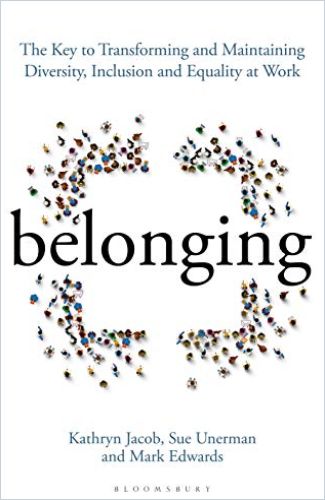Integrate your marginalized employees to develop a more ethical corporate culture – and healthier bottom line.

Empathy and Collaboration
Backlash against identity politics often impedes workplace diversity initiatives – which, themselves, can become echo chambers that do little to change workplace culture. In this call-to-action, bestsellers Kathryn Jacob and Sue Unerman and mindfulness consultant Mark Edwards argue for diversity as a moral imperative and organizational advantage. Instead of avoiding conflict through imposed conformity, they advocate embracing disagreements and offer practical mindfulness techniques for managing discord in productive ways.
“Pale, Male, Stale”
Workplace culture, the authors insist, must shift focus from competition and traditional white male values to belonging. A culture of belonging derives from empathy and collaboration.
Though minority groups have made strides toward representation and inclusion, the authors point to persistent disparities in recruitment, treatment and pay in the United Kingdom and United States. Despite the more than $7.5 billion spent on diversity initiatives each year, for example, women, LGBTQ+, disabled and Black, Asian and Minority Ethnic (BAME) employees receive fewer promotions than their straight, white male counterparts.
Beyond the moral imperative, there is every reason for a company to build and to maintain a more positive culture for everyone.Kathryn Jacob, Sue Unerman and Mark R. Edwards
The authors report that one in three people in the United Kingdom, and one in four in the United States, feel they don’t belong in their workplaces. More than one-third of mothers returning from maternity leave report feeling excluded. About half of registered disabled people, one-third of BAME and 50% of neurodivergent employees disclosed feeling marginalized.
The authors report that companies in the top quartile for racial, ethnic and gender diversity are significantly more likely to see returns above their industry median. Organizations with corporate cultures rife with hierarchy and individual competition – “pale, stale, male” workplaces – thwart growth and dynamism, and create toxic environments. More agile, inclusive companies thrive in periods of volatility, uncertainty, complexity and ambiguity (VUCA).
Diversity and inclusion doesn’t have to be a zero-sum game – it never did. Kathryn Jacob, Sue Unerman and Mark R. Edwards
The authors suggest that a backlash mentality among many straight, white men is a significant impediment to change. Identity politics, social media, diversity hiring and the discourse of intersectionality threaten some white men. Some white men’s defensive attitude rests on the false perception of a zero-sum game: that women’s and minorities’ progress comes at their expense.
Equitable Workplace
Management should never function as if diversity and talent are mutually exclusive reasons for promotion and recruitment. The authors observe that privileging traditional masculine qualities such as competitiveness, aggression and workaholism fuels this destructive mind-set. When composing job descriptions, they say, companies should avoid overly specific requirements that may exclude or discourage people from marginalized backgrounds.
Keep your job descriptions minimal – the more you put in, the more you create a barrier for those people who don’t exactly identify with the criteria.Kathryn Jacob, Sue Unerman and Mark R. Edwards
Straight, white men have an advantage: They are more likely to have stay-at-home partners who free up their availability for work.
From Diversity to Belonging
The authors remind readers that organizations need to develop cultures of belonging. Belonging means everyone feels heard. The solution to backlash and diversity fatigue is to bring all team members into the fold.
Recruiting a diverse team of people is only the start. Leaders then have to ensure that they create a culture where everyone in this diverse team feels that they belong. Kathryn Jacob, Sue Unerman and Mark R. Edwards
A culture of belonging benefits everyone. Managers can instill belonging with a zero-tolerance policy for exclusionary behaviors, such as microaggressions and derogatory banter. Colleagues should never make assumptions about how others identify, how they experience their identities, or what they do or do not find offensive.
Management must engender an environment in which all team members feel comfortable giving their input. CEOs should court insight from junior employees, especially those from different demographics from their own. Managers should counter exclusionary behavior with “microaffirmations”: small gestures of inclusion and listening.
Microaffirmations are tiny acts of opening doors of opportunity, gestures of inclusion and caring, and graceful acts of listening.MIT Sloan School of Management adjunct professor Mary Rowe
In a culture of belonging, success derives from how much you help others. Organizations and individuals must develop collaborative relationships rather than fostering competition within teams. Relationships should include “buddies” and “cheerleaders,” who provide comfort and boost morale along with beneficial relationships such as “sponsors,” “wing-persons” and “allies” from the “other side.” The authors underscore that comments and behavior that exclude straight, white men are not acceptable either, because progress occurs only when they also feel like part of the solution – that they belong.
Conflict Management Through Mindfulness
Belonging differs from consensus or conformity. Comfort with conflict nurtures belonging and enables stakeholders to voice their opinions. Workplace cultures should value and encourage empathy, the most vital skill for healthy conflict management.
Various techniques help team members react with empathy. Breath work and becoming aware of and managing thoughts can help colleagues transcend egos and triggers.
One of the most important skills you can have in the modern workplace, especially one that actively encourages diversity of thought, is the ability to check yourself, to calm down and to bring yourself back out of fight-or-flight mode.Kathryn Jacob, Sue Unerman and Mark R. Edwards
Recognizing and diffusing your emotional triggers, the authors assert, improves your ability to empathize with a colleague’s viewpoint and circumstances. Encourage empathy to create an environment in which each individual feels valued, necessary and affirmed.
A Blueprint for Skeptics
While the authors provide a basic primer for developing an inclusive office culture, they offer little groundbreaking information for those already vested in progress. Managers new or resistant to inclusion could learn the first steps toward creating such a culture – and how it benefits everyone – not just minority hires. Students, those new to the workplace and start-up managers will find a workable blueprint for ensuring they build a culture that nurtures differences. In a newly crowded field of books on diversity and inclusion, this stands out for the clarity of the authors’ guidance, and their refusal to descend into jargon.
Kathryn Jacob and Sue Unerman co-authored the bestseller The Glass Wall: Success and Businesses That Mean Business. Unerman also co-wrote Tell The Truth with Jonathan Salem Baskin. And Mark Edwards wrote The Tao of Bowie.






